These Politicians And Their Political Scandals Showed Questionable Moral Character And Leadership, But Voters Didn’t Care.
1. The Keating Five
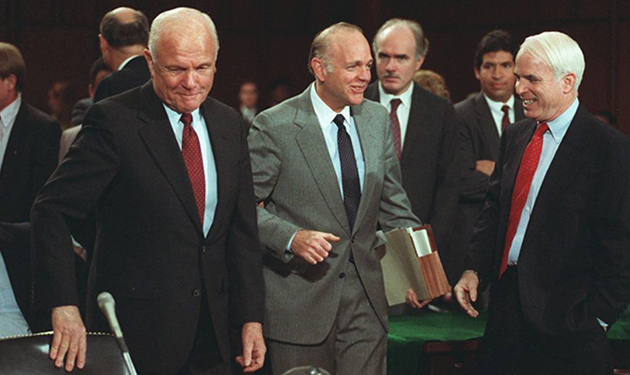
Of the biggest scandals of a political nature, the Keating Five stand out. Senator John McCain, a Republican, and four Democratic senators — John Glenn, Donald W. Riegle, Jr., Dennis DeConcini, and Alan Cranston — proved that money talks even if the one doling it out defrauds others and ruins lives. We submit to you Charles Keating, Chairman of the Lincoln Savings and Loan Association, which had made some risky investments with other people’s money and then defaulted in 1989, trashing around 23,000 investors in the process. The Keating Five accepted $1.3 million each in political contributions from Keating and in turn went to bat for him when the skeletons started to surface. Riegle, DeConcini, and Cranston, were found by the Senate Ethics Committee to have “substantially and improperly” interfered with the investigation into Keating’s antics. They were allowed to serve out their terms without punishment and each chose not to run for reelection. McCain and Glenn, however, did win reelection, despite the same committee determining that the pair used “poor judgment” for their roles in the controversy.
2. Marion Barry and Drugs
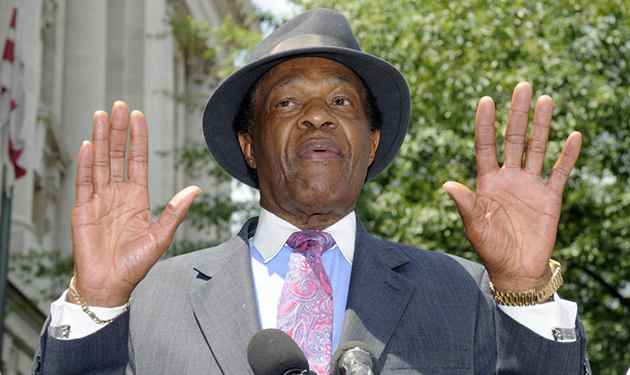
Speaking of controversy, no one knows it better than former mayor of Washington, D.C., and current councilman, Marion Barry. Early in Barry’s tenure, crime rates skyrocketed in part because he laid off 1,500 employees, many of whom were police officers. Rumors of his cocaine use quickly spread, and in 1990, he was arrested by the FBI and D.C. Police for smoking crack, which was caught on film by the way. After serving six months in prison, Barry would seek and win reelection in 1994. In 2002, he was elected as Ward 8 councilman, a position he still holds today in spite of multiple alleged traffic violations, failure to pay taxes, and racist remarks directed toward Asian-Americans. Immediately following his jail-time stint, Barry was back in the mix filing to run for office. His first campaign slogan after release — “He May Not Be Perfect, But He’s Perfect For D.C.” Unfortunately, that’s hard to disagree with, considering that the community has one of the highest crime rates in the nation. In fact, a recent study from Neighborhood Scout ranked D.C. with a 5 percent safety rating. (One hundred percent is safest, and it goes down from there in case you’re thinking this is done like golf scores.)
3. Ted Kennedy and the Incident at Chappaquiddick
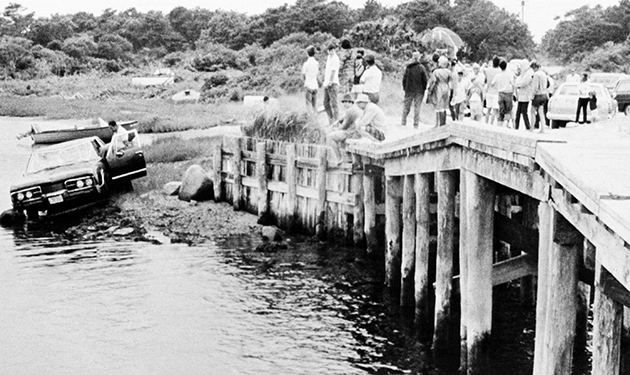
Senator Ted Kennedy was a popular force in Massachusetts politics for a number of years before his death of brain cancer on August 25, 2009. He may have even been President of the United States if not for his less-than-noble role in the Chappaquiddick Incident, another of the more appalling Political Scandals and acts of cowardice in the history of the United States. On the night of July 18, 1969, Kennedy was driving a vehicle with passenger Mary Jo Kopechne when he lost control — supposedly “not under the influence of liquor,” though the investigation has been (rightly) criticized as either corrupt or inept, take your pick. Kennedy was able to swim to safety. Kopechne reportedly died of suffocation with el zippo help from the rising political star. In fact, he didn’t even report the incident to authorities until approximately nine hours later. One of the rescue divers estimated that Kopechne was in the car for close to two hours before running out of oxygen. Kennedy threw himself at the mercy of his constituents and thought it best not to run for President. Massachusetts voters forgave and rewarded him with a job for the next 40 years.
4. Barack Obama and Fast and Furious / Benghazi
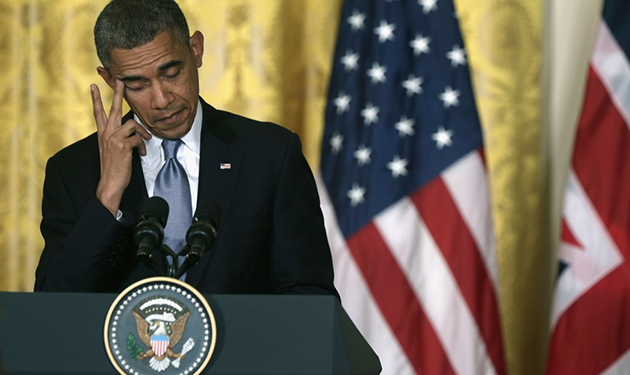
President Obama claimed that Operation Fast and Furious began under the previous administration — a lie, according to ABC News — but even if we give him the benefit of the doubt on that one, it undeniably went to Hell on his watch. The controversial “gunwalking” practice armed Mexican drug cartels and led to the deaths of several teenagers in a 2010 massacre at Juarez. The weapons were also used in the murder of US Border Patrol Agent Brian Terry that same year. President Obama and Attorney General Eric Holder at first played dumb on the practice, but as House Republicans leaned on Holder, Obama used executive privilege to conceal Operation Fast and Furious documents from the investigation. The Republican National Committee pounced on Obama’s use of the privilege, especially considering that he’d criticized President George W. Bush on the campaign trail in 2007 for using the practice. He also claimed his administration would be one of “the most open and transparent” if elected. Using the privilege when the investigation was starting to heat up, combined with his playing ignorant, looked terrible.
His handling of the September 11, 2012, Benghazi attacks also left much room for doubt as to what he did or didn’t know. Obama clearly downplayed the role of Al Qaeda for two weeks after the attack, which killed four Americans, pointing to an anti-Islam video and spontaneous outrage for which, Press Secretary Jay Carney claimed, could not have been foreseen. It later came out that the State Department was aware of the security risks prior to the attack and did not respond with reinforcement. Despite the very serious questions of leadership raised during these controversies, Americans reelected Obama in November 2012.
5. George W. Bush and Weapons of Mass Destruction
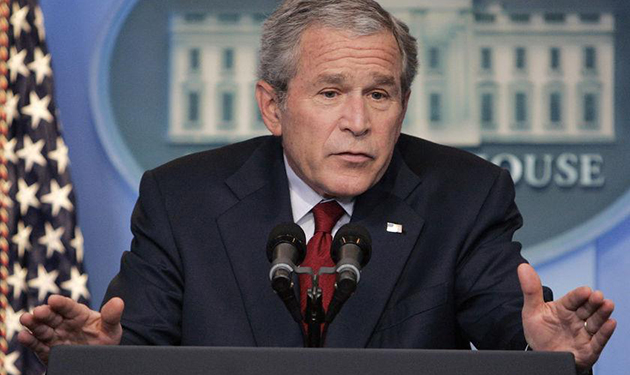
Republican President George W. Bush launched, with the aid of Congress, the Iraq war in 2003 under the false belief that there were weapons of mass destruction present. According to a study from the Watson Institute for International Studies at Brown University, reported by Reuters, that decision would end up costing close to 200,000 lives and run a staggering $2 trillion (with the potential to hit $6 trillion over a four-decade period due to interest costs accrued). Despite the faulty intelligence and the hair-trigger decision to overthrow Saddam Hussein, Americans rewarded Bush with a second term in 2004, making it possible for him to escalate spending and casualties. As a result, Bush’s second term was filled with economic difficulties and continuing global conflict. Gas prices hovered at a high-for-the-time $2 per gallon when he began term two. By July 15, 2008, they’d hit $4.12.
6. George H.W. Bush and the Iran-Contra Affair

Republican President Ronald Reagan came under fire in 1986 when the so-called “arms for hostages,” or Iran-Contra Affair came to light. Certain government officials derived funds from covert arms deals with the Islamic Republic of Iran and then diverted those monies to the Nicaraguan rebels to buy weapons. While there are conflicting reports on what Reagan knew and what he didn’t — it was later revealed that Reagan was struggling with Alzheimer’s before he ever left his second term of office — most believe George H.W. Bush knew more than he let on, and he did little to stave off suspicion. As he was gearing up to run for the Oval Office, Bush denied everything and claimed he was “out of the loop,” but a closer look at his diaries would reveal that he was “one of the few people that know fully the details” (his words). Bush would never address the admission, thus (justifiably) breeding mistrust. If there was nothing to hide, why refuse to speak about it? But if there was, the American people had a right to at least know what his involvement was. After all, if you’re going to run your mouth about it, why hide behind the Office? Americans would end up electing Bush in a landslide victory. Before ending his first and only term, Bush would pardon the remaining six officials, who were convicted in the affair.
You could fill libraries with other controversies, but these cases stand out because they should have ruined the careers of their participants, but people didn’t seem to care. The next time you grumble about “those politicians in Washington,” because of their numerous Political Scandals, remember that you’re the ones who put them there.
